An exploration of ghostly appearances in the Bible reveals a complex intersection of the supernatural and the divine, inviting further contemplation.

Ghost in the Bible
You might not be aware, but the Bible, an ancient text revered by many, subtly traverses the realm of the supernatural, including mentions of ghosts. These spectral mentions are not just fleeting; they're woven into narratives that have shaped centuries of theological discourse.
From the ghostly apparition that haunted King Saul to the New Testament's encounters that left disciples trembling, these stories offer a fascinating glimpse into how the spiritual world intersects with human history. The intriguing part? How these ancient accounts of ghosts continue to influence our modern understanding of the afterlife and spirituality.
Let's explore what lies beneath these mysterious biblical references.
Key Takeaways
- Biblical ghosts symbolize divine messages, unresolved issues, or spiritual awakenings.
- Interpretations of ghosts reflect cultural, ethical, and theological perspectives over time.
- Ghost narratives encourage deeper exploration of faith, ethics, and personal growth.
- The concept of ghosts bridges the earthly realm with divine or spiritual realities.
Ghosts: Definitions and Origins
Throughout history, the concept of ghosts has evolved, embodying the universal human experience of grappling with the unknown and the afterlife. You've witnessed how cultural beliefs shape perceptions of paranormal phenomena, with each society interpreting ghostly manifestations through its unique lens. This complex tapestry of interpretations underscores the profound impact of cultural context on the understanding of ghosts.
In exploring the origins and definitions of ghosts, you'll find that they're often depicted as the souls or spirits of the deceased who can't find peace. These entities are thought to linger due to unfinished business, seeking closure or conveying messages to the living. This notion, though varying in specifics, is a common thread across many cultures, highlighting a shared curiosity and fear of what lies beyond death.
The scholarly analysis of ghosts reveals a fascinating intersection between folklore, religion, and the human psyche. Cultural beliefs not only inform the characteristics attributed to ghosts but also influence the societal mechanisms for dealing with these paranormal phenomena. As you delve deeper, you'll appreciate the complexity of these beliefs and their role in shaping human understanding of life, death, and the possibility of an afterlife.
Old Testament Spirits
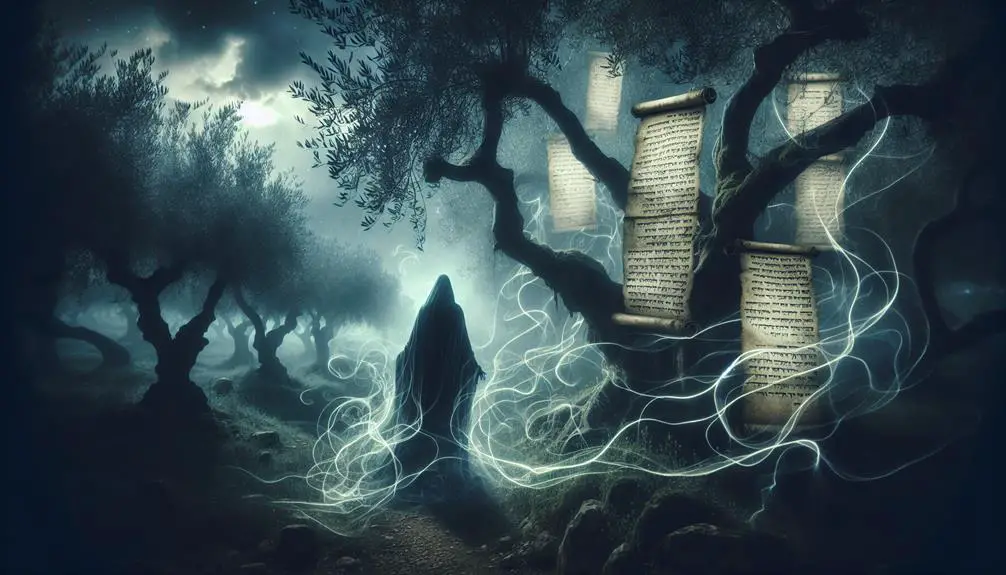
You'll find that the Old Testament presents a complex view of the spiritual realm.
The Witch of Endor incident, where Saul seeks the spirit of the prophet Samuel, showcases the ancient Israelites' beliefs about the afterlife and forbidden necromancy.
Saul's disobedient spirit query not only illustrates the consequences of defying God's commands but also provides insight into the cultural context of ghostly apparitions and spirit communication in biblical times.
Witch of Endor Incident
In the context of Old Testament narratives, the Witch of Endor incident stands out as a pivotal encounter between King Saul and a purported medium, illustrating early Jewish conceptions of spirits and the afterlife. This event raises critical questions about necromancy ethics and challenges historians on the matter of historical accuracy.
- Necromancy ethics: The practice, strongly condemned in Jewish law, provides a moral dilemma within the narrative.
- Historical accuracy: Scholars debate the factual basis of this account, considering its implications for understanding ancient beliefs.
- Spiritual worldview: The incident reflects ancient views on the afterlife and spirit interaction.
- Cultural significance: It highlights the cultural context surrounding death and the supernatural in ancient Jewish society.
Analyzing this episode sheds light on complex theological and ethical issues within ancient texts.
Saul's Disobedient Spirit Query
Why did Saul's decision to consult a spirit through the Witch of Endor, defying Jewish prohibitions, become such a significant moment in Old Testament narratives on disobedience and divine law? This act not only highlighted the moral ambiguity present in desperate times but also set a precedent for the prophetic consequences of disobedience.
Aspect |
Implication |
|---|---|
Divine Prohibition |
Direct violation of Jewish law. |
Moral Ambiguity |
Challenges in ethical decision-making. |
Prophetic Consequences |
Foretold downfall due to disobedience. |
Spiritual Precedent |
Established consequences for consulting spirits. |
Saul's query to a forbidden spirit underscores a pivotal clash between desperation and divine mandate, inviting reflection on the limits of faith and authority.
New Testament Apparitions

Several instances in the New Testament feature apparitions that have sparked both scholarly debate and theological reflection. Central to these are Jesus' apparitions after His resurrection and Paul's visions, which play pivotal roles in the narrative and development of early Christian thought.
- Jesus' Apparitions: Post-resurrection, Jesus appears to His disciples on multiple occasions. These apparitions are critical for affirming His resurrection and the continuation of His teachings. They're not merely ghostly appearances but are presented as tangible, with Jesus eating and inviting Thomas to touch His wounds.
- Paul's Visions: Paul's conversion on the road to Damascus is one of the most significant apparitions in the New Testament. This vision not only transforms Saul, the persecutor, into Paul, the apostle but also underscores the power of divine intervention in guiding the early Church.
- The Transfiguration: This event, where Jesus is transformed and appears with Moses and Elijah, serves as a bridge between the Old and New Testaments, reinforcing Jesus' messianic role.
- Angel Appearances: Angels frequently appear, providing guidance and messages from God. These apparitions underscore the heavenly support for Jesus' mission and the early Christian community.
These apparitions are integral to understanding the New Testament's theological landscape, offering insights into the divine's interaction with humanity.
The Witch of Endor Incident
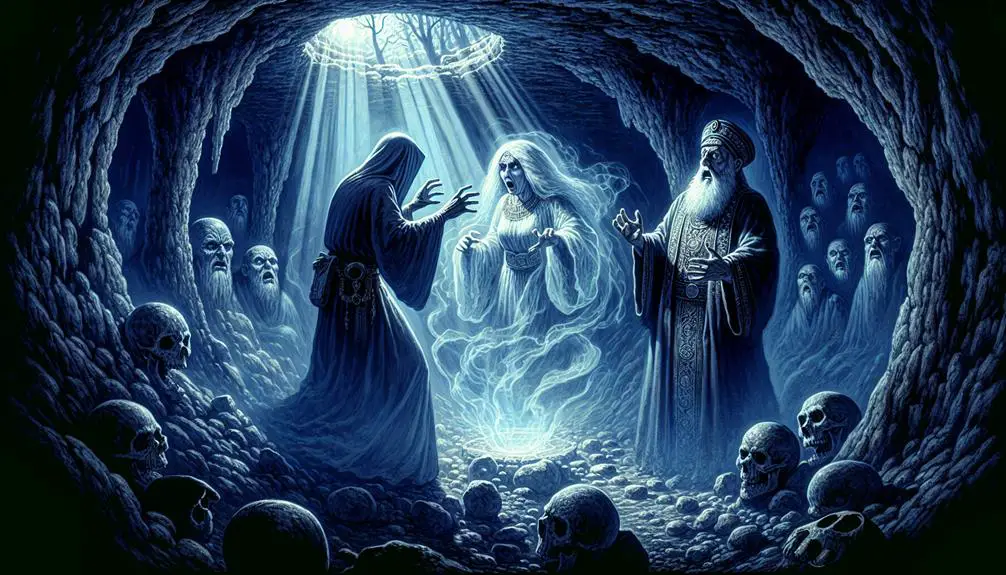
Turning our attention to the Old Testament, we encounter the enigmatic episode of the Witch of Endor, a narrative that challenges traditional perceptions of the spiritual realm. This story, nestled within the context of 1 Samuel 28, serves as a pivotal exploration of necromancy ethics in ancient times. King Saul, in a state of despair and seeking guidance for an upcoming battle, turns to a witch to summon the spirit of the deceased prophet Samuel. This act of necromancy, explicitly forbidden in Deuteronomic law, places Saul at a crossroads of moral and spiritual dilemma.
The historical context of this incident is crucial for understanding its complexity. In a time when divination practices were common among neighboring cultures, Israel's strict monotheism and accompanying legal codes set it apart. The Witch of Endor episode, therefore, not only delves into the realm of the afterlife and communication with the dead but also reflects the tension between cultural practices and religious laws.
Analyzing this narrative sheds light on the ancient Israelites' views on the afterlife, the ethics surrounding necromancy, and the consequences of violating divine commandments. It underscores the complexities of navigating faith, power, and the unseen world in a historical context fraught with spiritual and ethical challenges.
Interpretations of Biblical Ghosts
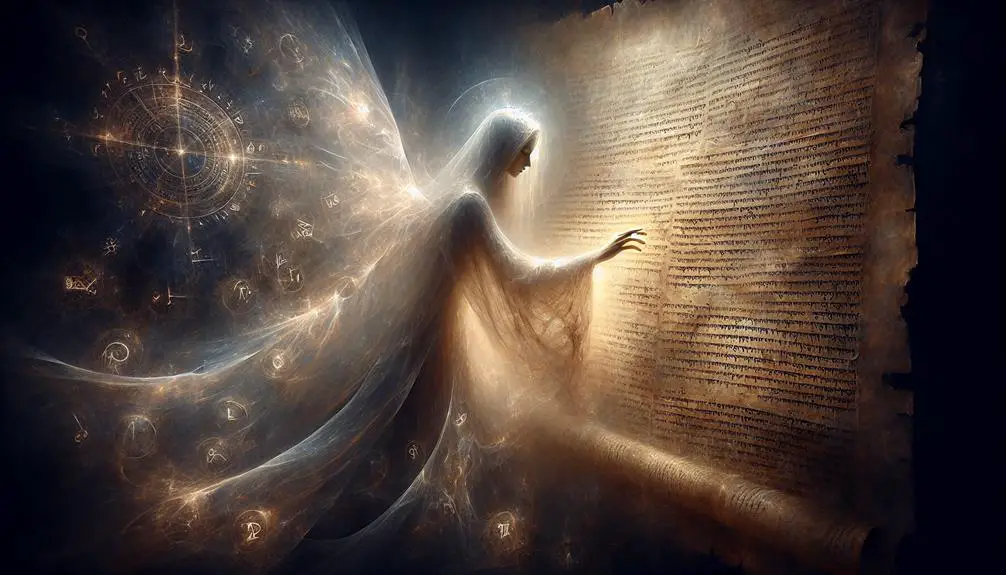
You'll find that interpretations of biblical ghosts vary widely, reflecting diverse theological perspectives.
The analysis of spiritual entities explained in the scripture often hinges on understanding ghosts as either literal beings or symbolic representations.
This exploration allows you to grasp the complexities and nuances of ghosts' symbolism and meaning within a biblical context.
Spiritual Entities Explained
Often, the Bible's references to ghosts and spiritual entities spark intense debate among scholars regarding their true nature and significance. You're delving into a realm where haunted locations and paranormal experiences intersect with ancient texts, leading to a rich tapestry of interpretations.
- Angelic Beings: Often considered messengers or warriors of God, distinct from human spirits.
- Demons: Viewed as malevolent spirits opposing God, possibly fallen angels.
- The Holy Ghost: Represents a facet of God's presence, distinct from the concept of human ghosts.
- Sheol's Spirits: In Old Testament contexts, these entities inhabit a shadowy afterlife, not actively interacting with the living world.
This analysis uncovers layers beneath the surface, offering a glimpse into how spiritual entities are woven into biblical narratives.
Ghosts: Symbolism & Meaning
In exploring the interpretations of biblical ghosts, it's crucial to understand their symbolic significance and the meanings they convey within the texts. These spectral figures often reflect cultural perceptions of the afterlife, serving as a bridge between the earthly and the divine. Their appearances can symbolize divine messages, warnings, or judgments, deeply rooted in the afterlife concepts prevalent at the time.
Symbol |
Meaning |
|---|---|
Ghostly Visitations |
Often a sign of unresolved issues or divine intervention. |
Ethereal Voices |
Represent divine communication or a call to spiritual awareness. |
Unsettling Presences |
Can symbolize guilt, unresolved sin, or divine judgment. |
Transfiguration |
Indicates transformation, revelation, or a deeper spiritual truth. |
Through these symbols, biblical ghosts convey complex theological and moral lessons, offering insight into the spiritual and eschatological beliefs of ancient societies.
Implications for Modern Faith
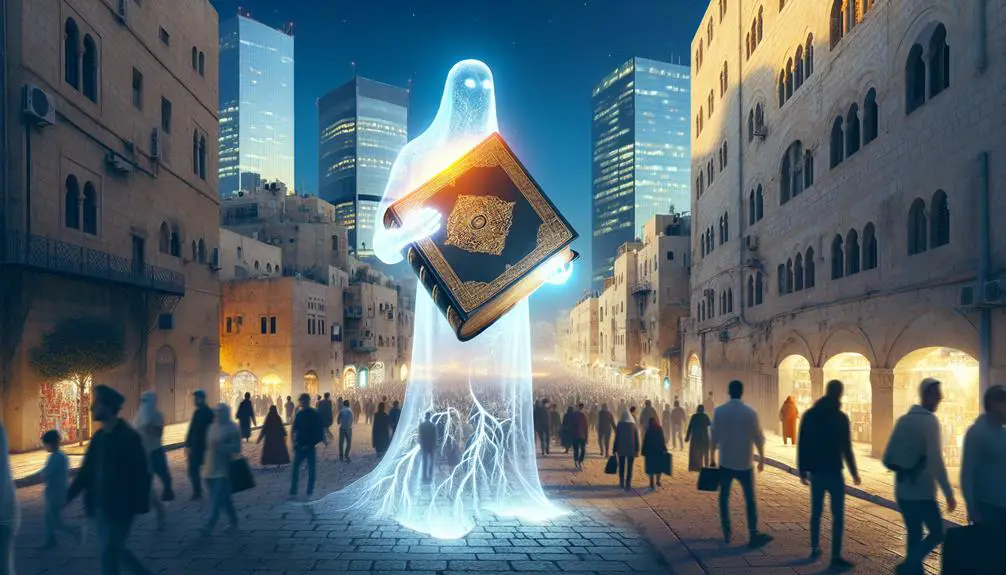
Throughout history, the interpretation of ghosts in the Bible has profoundly influenced modern faith and spiritual beliefs. As you delve into this complex topic, consider how the evolving understanding of these spectral figures reflects broader shifts in religious thought. The dialogue between modern skepticism and ancient texts plays a critical role in the faith evolution, challenging believers and scholars alike to reassess and often redefine their spiritual frameworks.
- Integration with Science and Rationalism: The reconciliation of biblical ghost stories with modern scientific understanding encourages a more metaphorical or allegorical interpretation of scripture.
- Cultural and Religious Syncretism: The influence of ghost narratives in the Bible on various cultures has led to a blending of Christian beliefs with indigenous spiritual traditions, enriching the global religious landscape.
- Ethical and Moral Implications: How ghost stories are interpreted can influence ethical and moral teachings within religious communities, affecting views on afterlife, redemption, and divine justice.
- Personal Faith Journey: For many believers, grappling with the supernatural aspects of their faith, such as ghosts, can lead to deeper spiritual exploration and personal growth.
This complex interplay between tradition and modernity offers a unique lens through which to view the ongoing evolution of faith and belief systems.
Frequently Asked Questions
How Do Different Christian Denominations Interpret the Presence of Ghosts or Spirits as Described in the Bible?
You're exploring how various Christian denominations perceive ghosts or spirits, focusing on spiritual warfare and afterlife concepts. Each tradition interprets these entities through a theological lens, often diverging on their nature and implications.
Catholics might see them within the context of purgatory and intercession, while Evangelicals may emphasize spiritual warfare against malevolent forces. Mainline Protestants could interpret these mentions metaphorically, aligning with broader theological views on the afterlife.
Are There Any Accounts or Teachings in the Bible That Specifically Advise How Believers Should Interact With or Respond to Ghosts or Spirits?
In the Bible, specific teachings advise believers on interacting with ghosts or spirits. For instance, ghost prohibitions are evident in passages warning against seeking the dead or engaging in spirit communication. These directives suggest a cautious stance towards the supernatural, emphasizing reliance on God's guidance over attempts to connect with the deceased.
Such instructions reflect a broader biblical perspective that prioritizes divine wisdom in matters of the spiritual realm.
How Have Historical and Cultural Contexts Influenced the Biblical Interpretations of Ghosts and Spirits Over the Centuries?
As time's river flows, the interpretation of ancient texts has been deeply colored by cultural myths and societal values. You've seen how historical and cultural contexts have sculpted the understanding of ghosts and spirits, transforming ancient narratives into a tapestry rich with diverse meanings.
This evolution reflects the dynamic interplay between cultural myths influence and the scholarly examination of texts, offering you a multifaceted view of these ethereal beings through the ages.
Can the Existence of Ghosts or Spirits, as Mentioned in the Bible, Be Reconciled With Scientific Explanations or the Views of Other Major World Religions?
You're diving into whether scientific explanations or views from major world religions align with the concept of ghosts.
Quantum theories and psychological analysis offer intriguing perspectives. Quantum mechanics might suggest that what we perceive as ghosts could be energy or entities in different dimensions.
Psychological analysis often interprets ghost sightings as manifestations of the subconscious or collective fears.
Both approaches provide a bridge between the spiritual and the empirical, allowing for a nuanced understanding of these phenomena.
What Role Do Personal Experiences or Testimonies of Encounters With the Supernatural Play in Shaping Believers' Perceptions of Ghosts in the Context of Biblical Teachings?
Your personal experiences or testimonies involving spirit communication or paranormal evidence significantly shape your perceptions of the supernatural. When you encounter what you believe to be a ghost, it's not just a fleeting moment; it's a profound experience that can deeply influence your understanding and belief systems.
These encounters, regardless of their alignment with biblical teachings, offer a unique lens through which you interpret the existence and nature of ghosts.
Conclusion
In analyzing the spectral presence woven through the biblical tapestry, you've journeyed through shadows that dance at the edges of faith and reason.
The Bible, a beacon in the night, guides us in interpreting these ethereal encounters. Whether viewed through the lens of ancient tradition or modern belief, these ghostly narratives challenge you to ponder the unseen dimensions of existence.
Like a ship navigating by the stars, let these stories steer your spiritual exploration, inviting reflection on the mysteries that transcend our understanding.

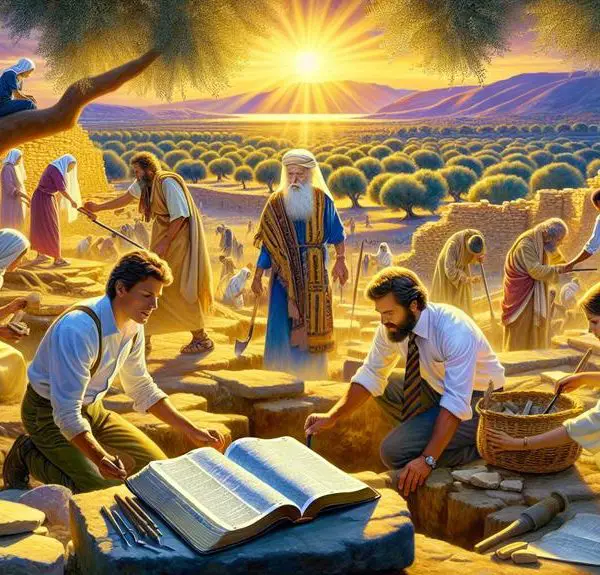
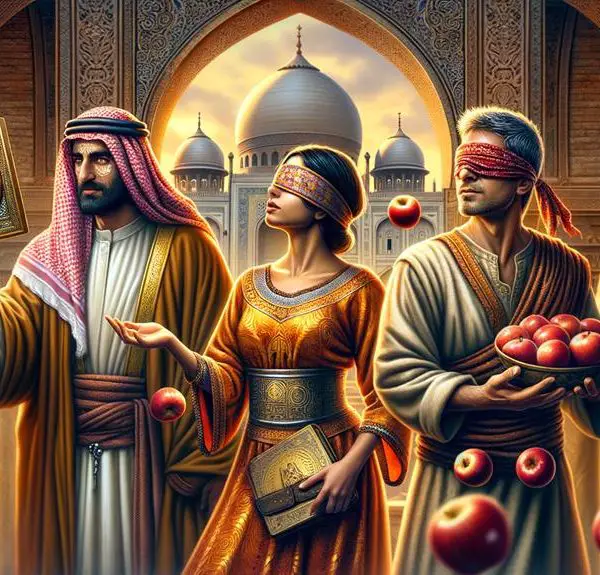
Sign up